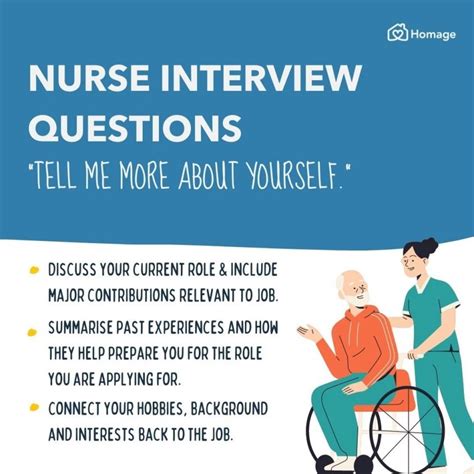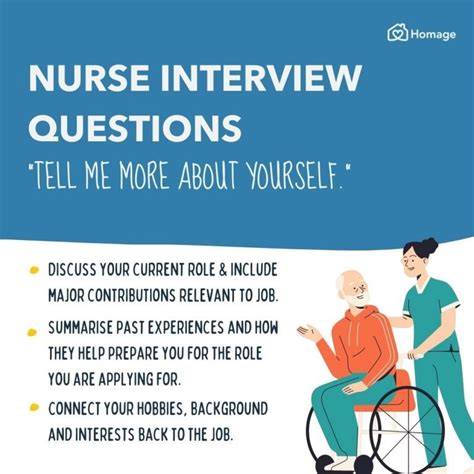Intro
Prepare for your nursing interview with confidence! Discover the top 10 nursing interview questions and answers, including behavioral and situational queries. Learn how to tackle common nursing interview questions, such as Why do you want to be a nurse? and What are your strengths and weaknesses? Get insider tips and expert advice to ace your nursing job interview.
As a nursing professional, preparing for a job interview can be a daunting task. You want to showcase your skills, experience, and passion for nursing, while also demonstrating your fit for the specific role and organization. To help you prepare, we've compiled a list of the top 10 nursing interview questions and answers. Whether you're a seasoned nurse or just starting your career, these questions and answers will give you the confidence you need to ace your next nursing interview.

Why Do You Want to Be a Nurse?
This is often one of the first questions asked in a nursing interview, and it's an opportunity for you to share your passion for nursing and why you chose this career path. When answering this question, be honest and speak from the heart.
Example answer: "I've always been drawn to the healthcare field because I want to make a difference in people's lives. As a nurse, I have the opportunity to provide hands-on care, educate patients, and support families during some of the most challenging times. I find it incredibly rewarding to see patients recover and thrive, and I'm committed to delivering high-quality, compassionate care."
Tips for Answering This Question:
- Be sincere and authentic in your response.
- Share a personal experience that illustrates your passion for nursing.
- Highlight your values and motivations for becoming a nurse.
What Are Your Strengths and Weaknesses?
This classic interview question is an opportunity for you to showcase your self-awareness, honesty, and ability to grow. When discussing your strengths, be specific and provide examples of how they've helped you in your nursing career. When discussing your weaknesses, frame them as areas for improvement and highlight what you're doing to address them.
Example answer: "One of my strengths is my attention to detail. In my previous role, I was able to identify a medication error that could have had serious consequences for the patient. I'm proud of my ability to stay focused and vigilant, even in high-pressure situations. One area I'm working to improve is my delegation skills. As a nurse, I tend to want to take on too much myself, but I'm learning to trust my colleagues and delegate tasks effectively."
Tips for Answering This Question:
- Be honest and authentic in your response.
- Provide specific examples to illustrate your strengths and weaknesses.
- Frame your weaknesses as areas for improvement and highlight what you're doing to address them.
Why Do You Want to Work at This Hospital/Organization?
This question shows that you've done your research on the organization and are genuinely interested in the role. When answering this question, highlight the organization's mission, values, and initiatives that align with your own goals and values.
Example answer: "I'm impressed by this organization's commitment to patient-centered care and its reputation for excellence in nursing practice. I'm excited about the opportunity to work with a talented team of professionals who share my passion for delivering high-quality care. I'm also drawn to the organization's emphasis on professional development and continuing education, as I'm committed to ongoing learning and growth in my career."
Tips for Answering This Question:
- Do your research on the organization and its mission, values, and initiatives.
- Highlight the aspects of the organization that align with your own goals and values.
- Show enthusiasm and genuine interest in the role and organization.
How Would You Handle a Difficult Patient?
This scenario-based question is an opportunity for you to showcase your critical thinking, communication, and interpersonal skills. When answering this question, provide a specific example from your experience and walk the interviewer through your thought process and actions.
Example answer: "In my previous role, I had a patient who was becoming increasingly agitated and aggressive. I took a step back, listened to the patient's concerns, and validated their feelings. I then worked with the patient to identify a solution that met their needs and addressed their concerns. By staying calm, empathetic, and focused on the patient's needs, I was able to de-escalate the situation and improve the patient's experience."
Tips for Answering This Question:
- Provide a specific example from your experience.
- Walk the interviewer through your thought process and actions.
- Highlight your critical thinking, communication, and interpersonal skills.
What Do You Know About Our Organization's Culture?
This question shows that you've done your research on the organization's culture and values. When answering this question, highlight the aspects of the culture that resonate with you and provide examples of how you've demonstrated those values in your own practice.
Example answer: "From my research, I understand that this organization values teamwork, collaboration, and open communication. In my previous role, I worked on a team to develop and implement a new care pathway that improved patient outcomes and reduced readmissions. I was proud of our team's ability to work together, share ideas, and support each other in achieving our goals. I'm excited about the opportunity to join an organization that shares my values and prioritizes teamwork and collaboration."
Tips for Answering This Question:
- Do your research on the organization's culture and values.
- Highlight the aspects of the culture that resonate with you.
- Provide examples of how you've demonstrated those values in your own practice.
How Do You Prioritize Your Work and Manage Your Time?
This question is an opportunity for you to showcase your organizational skills, attention to detail, and ability to prioritize tasks. When answering this question, provide a specific example from your experience and highlight your use of tools, such as to-do lists or calendars, to manage your time.
Example answer: "In my previous role, I used a combination of to-do lists and calendars to prioritize my work and manage my time. I made sure to prioritize tasks based on urgency and importance, and I delegated tasks to my colleagues when possible. I also took regular breaks to recharge and refocus, which helped me stay productive and efficient throughout the shift. By prioritizing my work and managing my time effectively, I was able to meet my responsibilities and deliver high-quality care to my patients."
Tips for Answering This Question:
- Provide a specific example from your experience.
- Highlight your use of tools, such as to-do lists or calendars, to manage your time.
- Emphasize your attention to detail and ability to prioritize tasks.
How Do You Handle Conflict or Disagreement with a Colleague?
This scenario-based question is an opportunity for you to showcase your conflict resolution skills, communication skills, and ability to work collaboratively. When answering this question, provide a specific example from your experience and walk the interviewer through your thought process and actions.
Example answer: "In my previous role, I had a disagreement with a colleague about a patient's care plan. I listened to their concerns, validated their perspective, and shared my own thoughts and ideas. We worked together to find a solution that met the patient's needs and addressed our concerns. By staying calm, empathetic, and focused on the patient's needs, we were able to resolve the conflict and improve the patient's experience."
Tips for Answering This Question:
- Provide a specific example from your experience.
- Walk the interviewer through your thought process and actions.
- Highlight your conflict resolution skills, communication skills, and ability to work collaboratively.
What Are Your Long-Term Career Goals?
This question is an opportunity for you to showcase your ambition, motivation, and commitment to your nursing career. When answering this question, be honest and provide specific examples of your goals and how you plan to achieve them.
Example answer: "In the next five years, I hope to advance to a leadership role, such as a charge nurse or nurse manager. I'm committed to ongoing learning and professional development, and I plan to pursue additional education and certifications to support my career goals. I'm excited about the opportunity to take on new challenges and contribute to the organization's mission and vision."
Tips for Answering This Question:
- Be honest and specific about your long-term career goals.
- Provide examples of how you plan to achieve your goals.
- Highlight your ambition, motivation, and commitment to your nursing career.
Why Are You Leaving Your Current Job?
This question is an opportunity for you to showcase your professionalism, honesty, and career aspirations. When answering this question, be honest and provide a positive spin on your decision to leave.
Example answer: "I'm leaving my current job to pursue new challenges and opportunities for growth and development. I'm excited about the opportunity to join an organization that aligns with my values and prioritizes patient-centered care. I'm grateful for the experience and skills I've gained in my current role, but I'm ready to take the next step in my career and contribute to an organization that shares my passion for nursing."
Tips for Answering This Question:
- Be honest and positive about your decision to leave.
- Highlight your career aspirations and desire for growth and development.
- Emphasize your enthusiasm for the new role and organization.
Do You Have Any Questions for Me?
This is often the final question asked in a nursing interview, and it's an opportunity for you to ask questions, demonstrate your interest in the role and organization, and showcase your critical thinking skills. When answering this question, prepare a list of thoughtful questions to ask the interviewer.
Example questions: "What are the biggest challenges facing the nursing team in this organization, and how do you see this role contributing to the team's success? Can you tell me more about the organization's approach to professional development and continuing education for nurses? What opportunities are there for growth and advancement within the organization?"
Tips for Answering This Question:
- Prepare a list of thoughtful questions to ask the interviewer.
- Demonstrate your interest in the role and organization.
- Showcase your critical thinking skills and enthusiasm for the position.

In conclusion, acing a nursing interview takes preparation, practice, and confidence. By reviewing these top 10 nursing interview questions and answers, you'll be well-prepared to showcase your skills, experience, and passion for nursing. Remember to be honest, specific, and enthusiastic in your responses, and don't be afraid to ask questions. Good luck with your next nursing interview!
What is the most important thing to remember when preparing for a nursing interview?
+The most important thing to remember when preparing for a nursing interview is to be honest, specific, and enthusiastic in your responses. Review the job description, research the organization, and prepare examples of your skills and experience.
What are some common mistakes to avoid in a nursing interview?
+
How can I showcase my passion for nursing in an interview?
+To showcase your passion for nursing in an interview, be specific about your experiences, skills, and goals. Share stories about why you became a nurse, and highlight your achievements and contributions to patient care. Additionally, express your enthusiasm for the role and organization, and ask thoughtful questions about the position and team.
